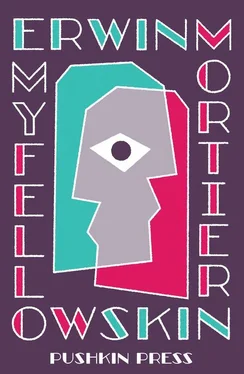Erwin Mortier - My Fellow Skin
Здесь есть возможность читать онлайн «Erwin Mortier - My Fellow Skin» весь текст электронной книги совершенно бесплатно (целиком полную версию без сокращений). В некоторых случаях можно слушать аудио, скачать через торрент в формате fb2 и присутствует краткое содержание. Год выпуска: 2015, Издательство: Pushkin Press, Жанр: Современная проза, на английском языке. Описание произведения, (предисловие) а так же отзывы посетителей доступны на портале библиотеки ЛибКат.
- Название:My Fellow Skin
- Автор:
- Издательство:Pushkin Press
- Жанр:
- Год:2015
- ISBN:нет данных
- Рейтинг книги:4 / 5. Голосов: 1
-
Избранное:Добавить в избранное
- Отзывы:
-
Ваша оценка:
- 80
- 1
- 2
- 3
- 4
- 5
My Fellow Skin: краткое содержание, описание и аннотация
Предлагаем к чтению аннотацию, описание, краткое содержание или предисловие (зависит от того, что написал сам автор книги «My Fellow Skin»). Если вы не нашли необходимую информацию о книге — напишите в комментариях, мы постараемся отыскать её.
My Fellow Skin — читать онлайн бесплатно полную книгу (весь текст) целиком
Ниже представлен текст книги, разбитый по страницам. Система сохранения места последней прочитанной страницы, позволяет с удобством читать онлайн бесплатно книгу «My Fellow Skin», без необходимости каждый раз заново искать на чём Вы остановились. Поставьте закладку, и сможете в любой момент перейти на страницу, на которой закончили чтение.
Интервал:
Закладка:
I tore the letter into four pieces.
My mother was shocked. “You will be going, won’t you?”
“I’ll go on my own. I’ll ask Pa for the car. He won’t be needing it on Saturday, what with moving house.”
“It’s in the paper,” Roland said. “It happened at the seaside. He’d been with relatives, I think.”
“His aunt,” I said.
“You should have seen that photograph, with the lorry, and that bike of his. Not a pretty picture.”
“I want to go and see him… pay my respects,” I said. “They brought him to the mortuary yesterday.”
“Why don’t you wait until your father gets back,” my mother said. “He can drive you there.”
“I don’t want to wait until tonight. I’d rather go before it gets busy. It’ll be quiet there now.”
“You bet it will,” Roland said, grinning.
I glared at him.
He cleared his throat, drank down his cup of coffee, and said in an apologetic tone, “You know what? I’ll take you there if you like.”
*
The antechamber of death. A low pavilion with a glass entrance flanked by rose beds and a sign saying MORTUARY planted among flowering lavender bushes.
A hall with a floor of gleaming granite and a counter behind which sits a young woman wearing demure make-up. At the request of each mourner she makes a brief call to some remote place in the depths of the building, where the dead are assembled on hard, straight-backed chairs, passing the time with back issues of magazines and desultory exchanges about the weather.
“I’ve come for De Vries,” I said. “Willem de Vries.”
Roland’s shoes squealed on the floor behind me.
The young woman flicked the pages of a register, lifted the receiver and dialled an extension. She said we were to wait over there, in the waiting room across the corridor.
I heard her murmuring into the phone and noted a certain urgency in her tone, as if she were talking to him in person, telling him to comb his hair, to be sensible and mind his manners, and no, he was to put that comic away, he could return to it later.
The walls of the waiting room were decorated with photographs of hazy parkland landscapes. A little stack of solemn brochures lay on the table.
Thoughts at the graveside.
Callest Thou, Oh Lord?
On the cover a drawing of a hand and a heart crowned with thorns against a background of flames: See, I make everything whole again. Roland stood with his back to me, staring out of the window at the car park.
People trooped down the corridor. Sniffling, coats being buttoned up. I heard the young woman intoning her professional condolences.
“It’s them,” Roland said. “I can see that sister of his. What’s her name? Katrien…”
He swung round and moved away from the window.
The young woman came to fetch us. She accompanied us down the hall, until it branched off in a long corridor. “Sixth door on the right,” she said, turning on her heel.
A soft drone of mournful music poured from speakers fitted in the ceiling. The doors were painted a dingy blue, with pearl-grey plastic handles that made me think of the reserved neutrality of doctors’ surgeries; as if the dead might be holding office there for their relatives, with their hands loosely folded on the desk in front of them, smiling amicably and saying, “I was just watering my radishes. It started up here, in my chest. Can I offer you something to drink?”
Sixth door on the right. My courage sank to my shoes. My heart pounded in my throat.
Roland lagged behind. His eyes glinted anxiously in the dimly lit corridor. “If it’s all the same to you I’d rather wait outside.”
Looking the other way, he said, “Not my thing, to be honest. Freaks me out.” He strode ahead to the end of the corridor, where a plant languished in a pot. “Sorry about that.”
Him, scared. The killer of kittens. Squasher of butterflies.
I pushed open the door. From the ceiling emanated the same mournful music, seemingly to blot out the possibility that the dead might still be breathing, exhaling the last lingering air, like bubbles rising from a sinking bottle.
He lay in his coffin with purple cloths draped across his stomach and hands bandaged like stumps. They had dressed him in a cream-coloured shirt, which he wouldn’t have been seen dead in when he was alive, not even for an exam — indeed, he used to go out of his way to buy the most garish Hawaii-print shirts he could find and equally ghastly ties, just to rile the teachers. There was something odd about the way the pale fabric was stretched taught across his chest, as if there were planks propping it up underneath.
His mouth was held shut with a bandage round his chin. His fair hair was for the most part tucked away, and in the glow of the spotlight illuminating his face, his cheeks showed signs of bruises and scratches under the generous coating of powder.
His skin was puffy, his lips swollen like the mouth of a river god in a Roman wall fountain. His forehead was creased, his eyebrows faintly wrinkled, as though he were sunk in thought about the extraordinary situation in which he found himself.
Next to a vase of arum lilies on a pedestal stood a glass of holy water and a palm frond. For a moment I pictured him blinking crossly at having water sprinkled on his face, sitting up, tearing off the bandage and raging, arms akimbo, “Hey you, what’s going on?”—which was what he always did when I was offended and turned away to sulk and wallow in self-pity.
There was a timid knock on the door. From the corridor came the sound of Roland coughing and rattling his car keys.
I wiped my tears, leaned over and put my lips to Willem’s forehead. The cold was unbearable.
I stepped out of the room, pulled the door behind me and left him to think things over.
CHAPTER 4
THIS BODY, it could be the body of a stranger. It was only because it mimicked my every move so slavishly in shop windows and mirrors and revealed more and more of my father’s face each time I shaved that I was moved to think: don’t I know you? I’m sure I’ve seen you somewhere before.
This face staring back at me has the same closed, self-absorbed look as the house used to have on summer evenings when all the shutters were closed and, up at the top, under the roof, were the shadows of children having pillow fights and tripping across the floorboards long past bedtime.
Willem would be nearly forty now. Balding like his Pa, maybe, or sleek like his mother, settling contentedly into a looser-fitting body, spreading and warm like a well-worn sofa.
In death he is nineteen. Just left school. Passed his driving test. Proud of his first car. As if it would be any use to him now, in that place without echo or response.
My mother must have cut the photograph out of the paper, and I never got round to throwing it away. It turns up occasionally between the pages of books, sometimes fluttering down on to my lap. The reporter did not lack an eye for drama, for the picture shows the truck driver being led away by the police. There are several vans and an ambulance. A passer-by, hands clapped to her cheeks, surveys the white sheet on the kerb with a trouser leg plus trainer poking out from underneath, and the twisted wreck of his bike which is partially hidden by the wheels of the truck.
It can’t have been more than half an hour after it happened. The body has yet to be released, the officers have yet to make their inquiries as to the cause of the accident. Someone has hastily covered him with the white of a shroud or christening robe.
For a long time I couldn’t bring myself to imagine what he must have looked like lying under that sheet, even though I had seen him in his coffin afterwards. I clung to the idea that he had let himself fall backwards, the way he flopped on to the lawn at his parents’ house on Fridays after school, with that enviable ability he had to exchange one world for another without a thought. It was like a miraculous postponement, like those few seconds of fierce concentration on the diving board during swimming class, before leaping into the air and falling into the chalice of water.
Читать дальшеИнтервал:
Закладка:
Похожие книги на «My Fellow Skin»
Представляем Вашему вниманию похожие книги на «My Fellow Skin» списком для выбора. Мы отобрали схожую по названию и смыслу литературу в надежде предоставить читателям больше вариантов отыскать новые, интересные, ещё непрочитанные произведения.
Обсуждение, отзывы о книге «My Fellow Skin» и просто собственные мнения читателей. Оставьте ваши комментарии, напишите, что Вы думаете о произведении, его смысле или главных героях. Укажите что конкретно понравилось, а что нет, и почему Вы так считаете.












